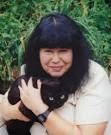I
saw her first in 1977. I was an 18-
year- old virgin, attending a poetry
reading alone at Ithaca College.
Her poems were mostly about sex: exotic, spontaneous sex.
How could you make love to him in an
elevator
you say. But it was a freight
elevator
I say, it went up very slowly, you
could lock
it between floors. Besides that was
a decade
ago, I was more adventurist then.
Oh, you say,
so you wouldn't fuck me in an
elevator, I see.
I like my comfort better now, I say,
but you
are my only comfort. Have you an
elevator in mind?
The
poem that lingered from that era was Vol Du Nuit, Night Flight.
Dreams of a twenty-year-old are salty
water
and the residual stickiness of berry jam
but they have the power to paralyze
a swimmer out beyond her depth and
strength.
Memory’s a minefield.
“One
must change a great deal between 18 and 20,” I thought. I had no disabling memories yet, no entanglements,
no obsessive, half filled diaries…
yet. To be 20 must be to be fully
evolved, to have a history of elevator-related memories.
Marge
Piercy stood there, in the Ben Light gym, describing a future, our future, in
which obsessive memory could disable even the most stable mind. She stood defiantly behind the
podium, dressed in black, long
straight hair flowing to mid
back. She was exotic as a human
could be, and yet she possessed an odd familiarity. She
was my eccentric Jewish aunt, the one who grows her own vegetables, has a rambling compost heap, and sleeps with oddly named cats who
become the subject of her poetry.
You were still a kid in high school
Water under the bridge
Long time ago
You’ve been around the world since
You did alright
You filled your dance card, saw the show
Interesting times
Water under the bridge
Water under the bridge and dynamite it behind
you
Memory
is a mine field, after all.
That
last line does not appear in Didion’s Democracy, but it should, both women are obsessed with
memory’s disorienting and destructive power.
I
grew into Marge Piercy throughout college. I could never read her novels, they explode with anger
and resentment, they pulse with misogyny
and men put on earth to destroy the world of women. Yet I always found odd tranquility in her poetry.
To fall in love so late is
dangerous.
Below,
lights are winking out. Cars crawl
into driveways
and fade into the snow. Planes make me think
of dying
suddenly, and loving of dying
slowly, the heat loss of failure and betrayed
trust.
Yet I cast myself on you, closing
my eyes as I leap and then opening them
wide
as I land. Love is plunging into darkness toward
a place that may
exist.
These words proved prophetic. Falling in love proved to be the
penultimate leap of faith (
Religion being the ultimate leap of faith)
We
saw Marge last night, at a poetry reading.
She no longer strolls, she limps on
arthritic legs She still dresses in black, still peppers her responses with “fuck”
Cue
Jackson Browne, I guess
Nothing survives
But the way we live our lives.
She
doesn’t write as much of sex these days, the spontaneous dangerous affections
of our, of her youth. The topic evidently doesn’t interest either of us any
more. Now she writes of Judaism
but, more importantly, she sketches a road map, a plan to survive one’s remaining years with dignity and joy.
Live as if you liked yourself, and it may
happen: reach out, keep reaching out, keep bringing in. This is how we are
going to live for a long time: not always, for every gardener knows that after
the digging, after the planting, after the long season of tending and growth,
the harvest comes.
At
evening’s end, she recited a new poem.
The blessing of the Day
But the discipline of blessings is to taste
each moment, the bitter, the sour, the sweet
and the salty, and be glad for what does not
hurt. The art is in compressing attention
to each little and big blossom of the tree
of life, to let the tongue sing each fruit,
its savor, its aroma and its use.
I am glad to be freed of constant pain.
I want to live my remaining years reciting that
line Marge Shared the other
night
Be glad for what does not hurt.
I am leaving two years of pain, pain so intense that I wished I were dead. The pain is
slowly clearing, and I am honestly grateful for my ever increasing pain free moments. What is aging but the acceptance
of pain? My medical practice has
been aided by my experiencing a 90 year old body blind and weak, and riddled
with pain. I understand know why
they beg me to kill them.
You
knew me in 1977, you still know me in 2013. Thanks, Marge.


No comments:
Post a Comment